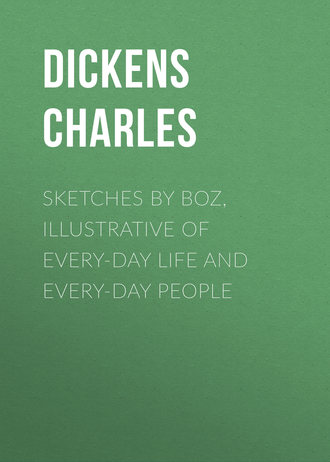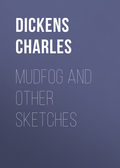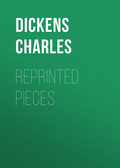
Чарльз Диккенс
Sketches by Boz, Illustrative of Every-Day Life and Every-Day People
The next day there was a grand account of the ascent in the morning papers, and the public were informed how it was the finest day but four in Mr. Green’s remembrance; how they retained sight of the earth till they lost it behind the clouds; and how the reflection of the balloon on the undulating masses of vapour was gorgeously picturesque; together with a little science about the refraction of the sun’s rays, and some mysterious hints respecting atmospheric heat and eddying currents of air.
There was also an interesting account how a man in a boat was distinctly heard by Mr. Green, jun., to exclaim, ‘My eye!’ which Mr. Green, jun., attributed to his voice rising to the balloon, and the sound being thrown back from its surface into the car; and the whole concluded with a slight allusion to another ascent next Wednesday, all of which was very instructive and very amusing, as our readers will see if they look to the papers. If we have forgotten to mention the date, they have only to wait till next summer, and take the account of the first ascent, and it will answer the purpose equally well.
CHAPTER XV – EARLY COACHES
We have often wondered how many months’ incessant travelling in a post-chaise it would take to kill a man; and wondering by analogy, we should very much like to know how many months of constant travelling in a succession of early coaches, an unfortunate mortal could endure. Breaking a man alive upon the wheel, would be nothing to breaking his rest, his peace, his heart – everything but his fast – upon four; and the punishment of Ixion (the only practical person, by-the-bye, who has discovered the secret of the perpetual motion) would sink into utter insignificance before the one we have suggested. If we had been a powerful churchman in those good times when blood was shed as freely as water, and men were mowed down like grass, in the sacred cause of religion, we would have lain by very quietly till we got hold of some especially obstinate miscreant, who positively refused to be converted to our faith, and then we would have booked him for an inside place in a small coach, which travelled day and night: and securing the remainder of the places for stout men with a slight tendency to coughing and spitting, we would have started him forth on his last travels: leaving him mercilessly to all the tortures which the waiters, landlords, coachmen, guards, boots, chambermaids, and other familiars on his line of road, might think proper to inflict.
Who has not experienced the miseries inevitably consequent upon a summons to undertake a hasty journey? You receive an intimation from your place of business – wherever that may be, or whatever you may be – that it will be necessary to leave town without delay. You and your family are forthwith thrown into a state of tremendous excitement; an express is immediately dispatched to the washerwoman’s; everybody is in a bustle; and you, yourself, with a feeling of dignity which you cannot altogether conceal, sally forth to the booking-office to secure your place. Here a painful consciousness of your own unimportance first rushes on your mind – the people are as cool and collected as if nobody were going out of town, or as if a journey of a hundred odd miles were a mere nothing. You enter a mouldy-looking room, ornamented with large posting-bills; the greater part of the place enclosed behind a huge, lumbering, rough counter, and fitted up with recesses that look like the dens of the smaller animals in a travelling menagerie, without the bars. Some half-dozen people are ‘booking’ brown-paper parcels, which one of the clerks flings into the aforesaid recesses with an air of recklessness which you, remembering the new carpet-bag you bought in the morning, feel considerably annoyed at; porters, looking like so many Atlases, keep rushing in and out, with large packages on their shoulders; and while you are waiting to make the necessary inquiries, you wonder what on earth the booking-office clerks can have been before they were booking-office clerks; one of them with his pen behind his ear, and his hands behind him, is standing in front of the fire, like a full-length portrait of Napoleon; the other with his hat half off his head, enters the passengers’ names in the books with a coolness which is inexpressibly provoking; and the villain whistles – actually whistles – while a man asks him what the fare is outside, all the way to Holyhead! – in frosty weather, too! They are clearly an isolated race, evidently possessing no sympathies or feelings in common with the rest of mankind. Your turn comes at last, and having paid the fare, you tremblingly inquire – ‘What time will it be necessary for me to be here in the morning?’ – ‘Six o’clock,’ replies the whistler, carelessly pitching the sovereign you have just parted with, into a wooden bowl on the desk. ‘Rather before than arter,’ adds the man with the semi-roasted unmentionables, with just as much ease and complacency as if the whole world got out of bed at five. You turn into the street, ruminating as you bend your steps homewards on the extent to which men become hardened in cruelty, by custom.
If there be one thing in existence more miserable than another, it most unquestionably is the being compelled to rise by candlelight. If you have ever doubted the fact, you are painfully convinced of your error, on the morning of your departure. You left strict orders, overnight, to be called at half-past four, and you have done nothing all night but doze for five minutes at a time, and start up suddenly from a terrific dream of a large church-clock with the small hand running round, with astonishing rapidity, to every figure on the dial-plate. At last, completely exhausted, you fall gradually into a refreshing sleep – your thoughts grow confused – the stage-coaches, which have been ‘going off’ before your eyes all night, become less and less distinct, until they go off altogether; one moment you are driving with all the skill and smartness of an experienced whip – the next you are exhibiting à la Ducrow, on the off-leader; anon you are closely muffled up, inside, and have just recognised in the person of the guard an old schoolfellow, whose funeral, even in your dream, you remember to have attended eighteen years ago. At last you fall into a state of complete oblivion, from which you are aroused, as if into a new state of existence, by a singular illusion. You are apprenticed to a trunk-maker; how, or why, or when, or wherefore, you don’t take the trouble to inquire; but there you are, pasting the lining in the lid of a portmanteau. Confound that other apprentice in the back shop, how he is hammering! – rap, rap, rap – what an industrious fellow he must be! you have heard him at work for half an hour past, and he has been hammering incessantly the whole time. Rap, rap, rap, again – he’s talking now – what’s that he said? Five o’clock! You make a violent exertion, and start up in bed. The vision is at once dispelled; the trunk-maker’s shop is your own bedroom, and the other apprentice your shivering servant, who has been vainly endeavouring to wake you for the last quarter of an hour, at the imminent risk of breaking either his own knuckles or the panels of the door.
You proceed to dress yourself, with all possible dispatch. The flaring flat candle with the long snuff, gives light enough to show that the things you want, are not where they ought to be, and you undergo a trifling delay in consequence of having carefully packed up one of your boots in your over-anxiety of the preceding night. You soon complete your toilet, however, for you are not particular on such an occasion, and you shaved yesterday evening; so mounting your Petersham great-coat, and green travelling shawl, and grasping your carpet-bag in your right hand, you walk lightly down-stairs, lest you should awaken any of the family, and after pausing in the common sitting-room for one moment, just to have a cup of coffee (the said common sitting-room looking remarkably comfortable, with everything out of its place, and strewed with the crumbs of last night’s supper), you undo the chain and bolts of the street-door, and find yourself fairly in the street.
A thaw, by all that is miserable! The frost is completely broken up. You look down the long perspective of Oxford-street, the gas-lights mournfully reflected on the wet pavement, and can discern no speck in the road to encourage the belief that there is a cab or a coach to be had – the very coachmen have gone home in despair. The cold sleet is drizzling down with that gentle regularity, which betokens a duration of four-and-twenty hours at least; the damp hangs upon the house-tops and lamp-posts, and clings to you like an invisible cloak. The water is ‘coming in’ in every area, the pipes have burst, the water-butts are running over; the kennels seem to be doing matches against time, pump-handles descend of their own accord, horses in market-carts fall down, and there’s no one to help them up again, policemen look as if they had been carefully sprinkled with powdered glass; here and there a milk-woman trudges slowly along, with a bit of list round each foot to keep her from slipping; boys who ‘don’t sleep in the house,’ and are not allowed much sleep out of it, can’t wake their masters by thundering at the shop-door, and cry with the cold – the compound of ice, snow, and water on the pavement, is a couple of inches thick – nobody ventures to walk fast to keep himself warm, and nobody could succeed in keeping himself warm if he did.
It strikes a quarter past five as you trudge down Waterloo-place on your way to the Golden Cross, and you discover, for the first time, that you were called about an hour too early. You have not time to go back; there is no place open to go into, and you have, therefore, no resource but to go forward, which you do, feeling remarkably satisfied with yourself, and everything about you. You arrive at the office, and look wistfully up the yard for the Birmingham High-flier, which, for aught you can see, may have flown away altogether, for preparations appear to be on foot for the departure of any vehicle in the shape of a coach. You wander into the booking-office, which with the gas-lights and blazing fire, looks quite comfortable by contrast – that is to say, if any place can look comfortable at half-past five on a winter’s morning. There stands the identical book-keeper in the same position as if he had not moved since you saw him yesterday. As he informs you, that the coach is up the yard, and will be brought round in about a quarter of an hour, you leave your bag, and repair to ‘The Tap’ – not with any absurd idea of warming yourself, because you feel such a result to be utterly hopeless, but for the purpose of procuring some hot brandy-and-water, which you do, – when the kettle boils! an event which occurs exactly two minutes and a half before the time fixed for the starting of the coach.
The first stroke of six, peals from St. Martin’s church steeple, just as you take the first sip of the boiling liquid. You find yourself at the booking-office in two seconds, and the tap-waiter finds himself much comforted by your brandy-and-water, in about the same period. The coach is out; the horses are in, and the guard and two or three porters, are stowing the luggage away, and running up the steps of the booking-office, and down the steps of the booking-office, with breathless rapidity. The place, which a few minutes ago was so still and quiet, is now all bustle; the early vendors of the morning papers have arrived, and you are assailed on all sides with shouts of ‘Times, gen’lm’n, Times,’ ‘Here’s Chron – Chron – Chron,’ ‘Herald, ma’am,’ ‘Highly interesting murder, gen’lm’n,’ ‘Curious case o’ breach o’ promise, ladies.’ The inside passengers are already in their dens, and the outsides, with the exception of yourself, are pacing up and down the pavement to keep themselves warm; they consist of two young men with very long hair, to which the sleet has communicated the appearance of crystallised rats’ tails; one thin young woman cold and peevish, one old gentleman ditto ditto, and something in a cloak and cap, intended to represent a military officer; every member of the party, with a large stiff shawl over his chin, looking exactly as if he were playing a set of Pan’s pipes.
‘Take off the cloths, Bob,’ says the coachman, who now appears for the first time, in a rough blue great-coat, of which the buttons behind are so far apart, that you can’t see them both at the same time. ‘Now, gen’lm’n,’ cries the guard, with the waybill in his hand. ‘Five minutes behind time already!’ Up jump the passengers – the two young men smoking like lime-kilns, and the old gentleman grumbling audibly. The thin young woman is got upon the roof, by dint of a great deal of pulling, and pushing, and helping and trouble, and she repays it by expressing her solemn conviction that she will never be able to get down again.
‘All right,’ sings out the guard at last, jumping up as the coach starts, and blowing his horn directly afterwards, in proof of the soundness of his wind. ‘Let ’em go, Harry, give ’em their heads,’ cries the coachman – and off we start as briskly as if the morning were ‘all right,’ as well as the coach: and looking forward as anxiously to the termination of our journey, as we fear our readers will have done, long since, to the conclusion of our paper.
CHAPTER XVI – OMNIBUSES
It is very generally allowed that public conveyances afford an extensive field for amusement and observation. Of all the public conveyances that have been constructed since the days of the Ark – we think that is the earliest on record – to the present time, commend us to an omnibus. A long stage is not to be despised, but there you have only six insides, and the chances are, that the same people go all the way with you – there is no change, no variety. Besides, after the first twelve hours or so, people get cross and sleepy, and when you have seen a man in his nightcap, you lose all respect for him; at least, that is the case with us. Then on smooth roads people frequently get prosy, and tell long stories, and even those who don’t talk, may have very unpleasant predilections. We once travelled four hundred miles, inside a stage-coach, with a stout man, who had a glass of rum-and-water, warm, handed in at the window at every place where we changed horses. This was decidedly unpleasant. We have also travelled occasionally, with a small boy of a pale aspect, with light hair, and no perceptible neck, coming up to town from school under the protection of the guard, and directed to be left at the Cross Keys till called for. This is, perhaps, even worse than rum-and-water in a close atmosphere. Then there is the whole train of evils consequent on a change of the coachman; and the misery of the discovery – which the guard is sure to make the moment you begin to doze – that he wants a brown-paper parcel, which he distinctly remembers to have deposited under the seat on which you are reposing. A great deal of bustle and groping takes place, and when you are thoroughly awakened, and severely cramped, by holding your legs up by an almost supernatural exertion, while he is looking behind them, it suddenly occurs to him that he put it in the fore-boot. Bang goes the door; the parcel is immediately found; off starts the coach again; and the guard plays the key-bugle as loud as he can play it, as if in mockery of your wretchedness.
Now, you meet with none of these afflictions in an omnibus; sameness there can never be. The passengers change as often in the course of one journey as the figures in a kaleidoscope, and though not so glittering, are far more amusing. We believe there is no instance on record, of a man’s having gone to sleep in one of these vehicles. As to long stories, would any man venture to tell a long story in an omnibus? and even if he did, where would be the harm? nobody could possibly hear what he was talking about. Again; children, though occasionally, are not often to be found in an omnibus; and even when they are, if the vehicle be full, as is generally the case, somebody sits upon them, and we are unconscious of their presence. Yes, after mature reflection, and considerable experience, we are decidedly of opinion, that of all known vehicles, from the glass-coach in which we were taken to be christened, to that sombre caravan in which we must one day make our last earthly journey, there is nothing like an omnibus.
We will back the machine in which we make our daily peregrination from the top of Oxford-street to the city, against any ‘buss’ on the road, whether it be for the gaudiness of its exterior, the perfect simplicity of its interior, or the native coolness of its cad. This young gentleman is a singular instance of self-devotion; his somewhat intemperate zeal on behalf of his employers, is constantly getting him into trouble, and occasionally into the house of correction. He is no sooner emancipated, however, than he resumes the duties of his profession with unabated ardour. His principal distinction is his activity. His great boast is, ‘that he can chuck an old gen’lm’n into the buss, shut him in, and rattle off, afore he knows where it’s a-going to’ – a feat which he frequently performs, to the infinite amusement of every one but the old gentleman concerned, who, somehow or other, never can see the joke of the thing.
We are not aware that it has ever been precisely ascertained, how many passengers our omnibus will contain. The impression on the cad’s mind evidently is, that it is amply sufficient for the accommodation of any number of persons that can be enticed into it. ‘Any room?’ cries a hot pedestrian. ‘Plenty o’ room, sir,’ replies the conductor, gradually opening the door, and not disclosing the real state of the case, until the wretched man is on the steps. ‘Where?’ inquires the entrapped individual, with an attempt to back out again. ‘Either side, sir,’ rejoins the cad, shoving him in, and slamming the door. ‘All right, Bill.’ Retreat is impossible; the new-comer rolls about, till he falls down somewhere, and there he stops.
As we get into the city a little before ten, four or five of our party are regular passengers. We always take them up at the same places, and they generally occupy the same seats; they are always dressed in the same manner, and invariably discuss the same topics – the increasing rapidity of cabs, and the disregard of moral obligations evinced by omnibus men. There is a little testy old man, with a powdered head, who always sits on the right-hand side of the door as you enter, with his hands folded on the top of his umbrella. He is extremely impatient, and sits there for the purpose of keeping a sharp eye on the cad, with whom he generally holds a running dialogue. He is very officious in helping people in and out, and always volunteers to give the cad a poke with his umbrella, when any one wants to alight. He usually recommends ladies to have sixpence ready, to prevent delay; and if anybody puts a window down, that he can reach, he immediately puts it up again.
‘Now, what are you stopping for?’ says the little man every morning, the moment there is the slightest indication of ‘pulling up’ at the corner of Regent-street, when some such dialogue as the following takes place between him and the cad:
‘What are you stopping for?’
Here the cad whistles, and affects not to hear the question.
‘I say [a poke], what are you stopping for?’
‘For passengers, sir. Ba – nk. – Ty.’
‘I know you’re stopping for passengers; but you’ve no business to do so. Why are you stopping?’
‘Vy, sir, that’s a difficult question. I think it is because we perfer stopping here to going on.’
‘Now mind,’ exclaims the little old man, with great vehemence, ‘I’ll pull you up to-morrow; I’ve often threatened to do it; now I will.’
‘Thankee, sir,’ replies the cad, touching his hat with a mock expression of gratitude; – ‘werry much obliged to you indeed, sir.’ Here the young men in the omnibus laugh very heartily, and the old gentleman gets very red in the face, and seems highly exasperated.
The stout gentleman in the white neckcloth, at the other end of the vehicle, looks very prophetic, and says that something must shortly be done with these fellows, or there’s no saying where all this will end; and the shabby-genteel man with the green bag, expresses his entire concurrence in the opinion, as he has done regularly every morning for the last six months.
A second omnibus now comes up, and stops immediately behind us. Another old gentleman elevates his cane in the air, and runs with all his might towards our omnibus; we watch his progress with great interest; the door is opened to receive him, he suddenly disappears – he has been spirited away by the opposition. Hereupon the driver of the opposition taunts our people with his having ‘regularly done ’em out of that old swell,’ and the voice of the ‘old swell’ is heard, vainly protesting against this unlawful detention. We rattle off, the other omnibus rattles after us, and every time we stop to take up a passenger, they stop to take him too; sometimes we get him; sometimes they get him; but whoever don’t get him, say they ought to have had him, and the cads of the respective vehicles abuse one another accordingly.
As we arrive in the vicinity of Lincoln’s-inn-fields, Bedford-row, and other legal haunts, we drop a great many of our original passengers, and take up fresh ones, who meet with a very sulky reception. It is rather remarkable, that the people already in an omnibus, always look at newcomers, as if they entertained some undefined idea that they have no business to come in at all. We are quite persuaded the little old man has some notion of this kind, and that he considers their entry as a sort of negative impertinence.
Conversation is now entirely dropped; each person gazes vacantly through the window in front of him, and everybody thinks that his opposite neighbour is staring at him. If one man gets out at Shoe-lane, and another at the corner of Farringdon-street, the little old gentleman grumbles, and suggests to the latter, that if he had got out at Shoe-lane too, he would have saved them the delay of another stoppage; whereupon the young men laugh again, and the old gentleman looks very solemn, and says nothing more till he gets to the Bank, when he trots off as fast as he can, leaving us to do the same, and to wish, as we walk away, that we could impart to others any portion of the amusement we have gained for ourselves.







